Inside the Ultimate Family Road Trip

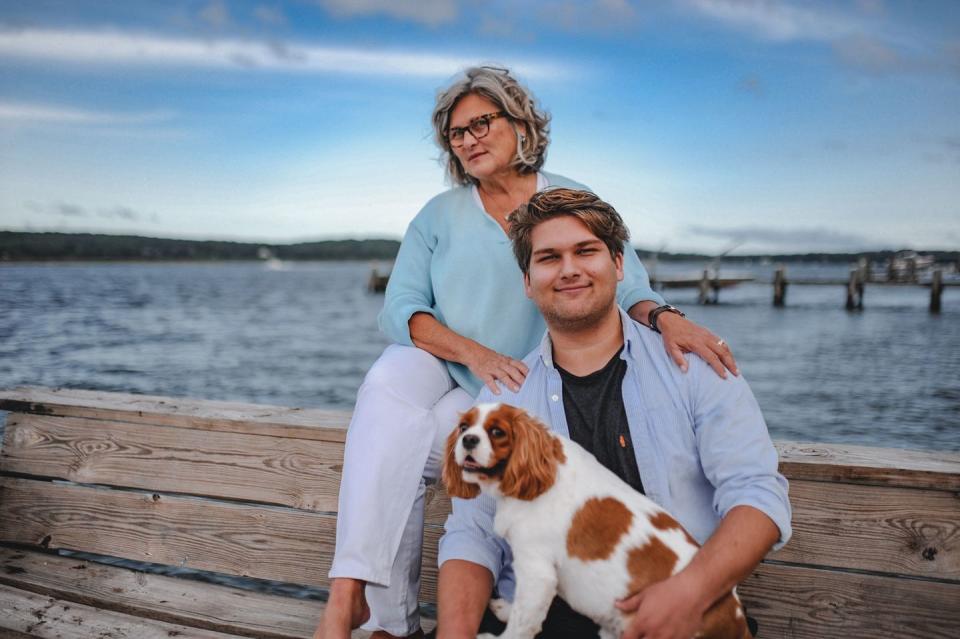
Earlier this year, journalist Cynthia McFadden won Emmy and Murrow Awards but her most daunting and rewarding assignment was the one she took with her son Spencer from their Connecticut home to California and back. It took their relationship quite literally to new lengths. The trip was ostensibly to collect Spencer’s belongings from his Los Angeles apartment, but over the course of 7,000 miles it became something else entirely, as they stepped outside their comfort zones to learn about each other and themselves, strengthening their bond (and nerves behind the wheel) along the way. Here are selections from their travel journal.
Day One
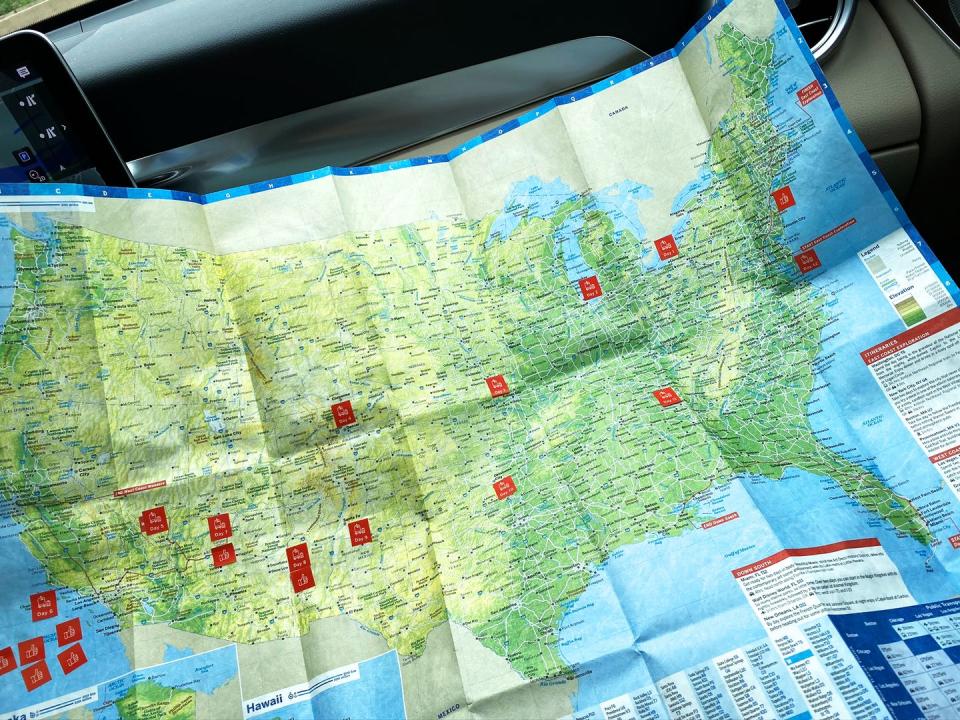
Spencer: What if the car breaks down? What if one of us gets sick? What if we get in an accident? What if we have a catastrophic fight? What if I have a panic attack while I’m driving? What if I get pulled over? What if I get arrested for driving without a license? What if I let Mom down?
The possibility of failure has kept me from trying more times than I can count. My brain mostly uses its power of imagination to show me all the ways life can go wrong. More often than not, when faced with so many tragic outcomes, I choose inaction. It is safer. Every ounce of me wants to tell Mom that this is a bad idea and I can’t do it. I can barely drive to CVS and back. How am I supposed to help drive across the country? I want to tell her she’s overestimated my abilities again. But I won’t. Not this time. I’m going to do something instead of nothing.
I wasn’t expecting to drive until after Kansas City, once the road got flat and straight. But somewhere in Pennsylvania, Mom asked me to take over. My knuckles whitened around the wheel a few moments later. Cars and trucks screeched by as I cautiously approached 50 miles an hour. I took a deep breath and focused on the road in front of me. Semi-trucks had never bothered me much as a passenger. As a driver, they petrified me, and Interstate 80 through Pennsylvania was lousy with them.
Highways had always seemed too broad by half, but once I was behind the wheel, I understood why civil engineers grasp for more and more lanes. The space you need when riding in a two-ton metal box careening by even more ton metal boxes and the space you need while controlling it are two different things. A few minutes in I realized I couldn't let go of the wheel. My hands were frozen in pale fists clenched around the steering wheel. By the time we entered Ohio my whole upper body had stiffened into an extension of the car, a mass of metal and plastic and leather focused on the sole purpose of keeping this vehicle on the road and moving forward.
As the claustrophobic forests of Pennsylvania gave way wide open Ohio, I was able to relax. Cleveland was a surprisingly pleasant city. Even more so after the day of driving we’d had. I felt a great sense of accomplishment having finished our first day. It was astonishingly empty. We were one of two families staying in the Ritz Carlton. Streets were mostly empty. Shops and restaurants were boarded up indefinitely. The baseball stadium, empty. Did I mention I didn't have a driver’s license?
Cynthia: Spencer grew up in NYC and like most of his friends, getting a driver’s license was not a priority. There was the subway, a bus if necessary, and a taxi when he had enough cash. But going to college in California put a different light on his “no-drivers-license-necessary” position. His new friends were pushing, especially as I let slip I’d get Spencer a car when he passed his driving test. Peer pressure put to good use. In late May, after nearly three months of quarantining in Connecticut I persuaded Spencer to practice driving with me as instructor—desperate times call for desperate measures, and driving schools were closed. He’d had his permit for nearly a year but still resisted getting behind the wheel. A few miles in, he insisted, “I hate driving. I just won’t live anywhere except New York. You can’t make me.”
Well, that was certainly true. Growing up in Maine being somewhat different than growing up in New York City, I have been driving since I was 15. Truth be told, I wanted Spencer to learn to drive for my sake. “I am too old to be the only driver in the family.” I retorted. He stared straight ahead.
You might wonder how either of us thought it would be a good idea to take a road trip in the middle of the pandemic from Connecticut to Los Angeles. Actually, after floating the idea, I tried to renege. I texted Spencer one morning from upstairs: “About the road trip. Let’s just fly. I am too old for this.” He was having none of it. “Flying is not safe, Mom.”
Knowing one of NBC’s Covid-19 experts came down with the virus after flying to New Orleans, I thought maybe he had a point. So, we decided driving was our only real option. We’d take every precaution: wearing our masks, washing our hands, and social distancing. We also set out knowing that we did so with enormous privilege. As a white mother and son traveling across the country, we didn’t have to fear that a traffic stop could end in tragedy.
Day Two
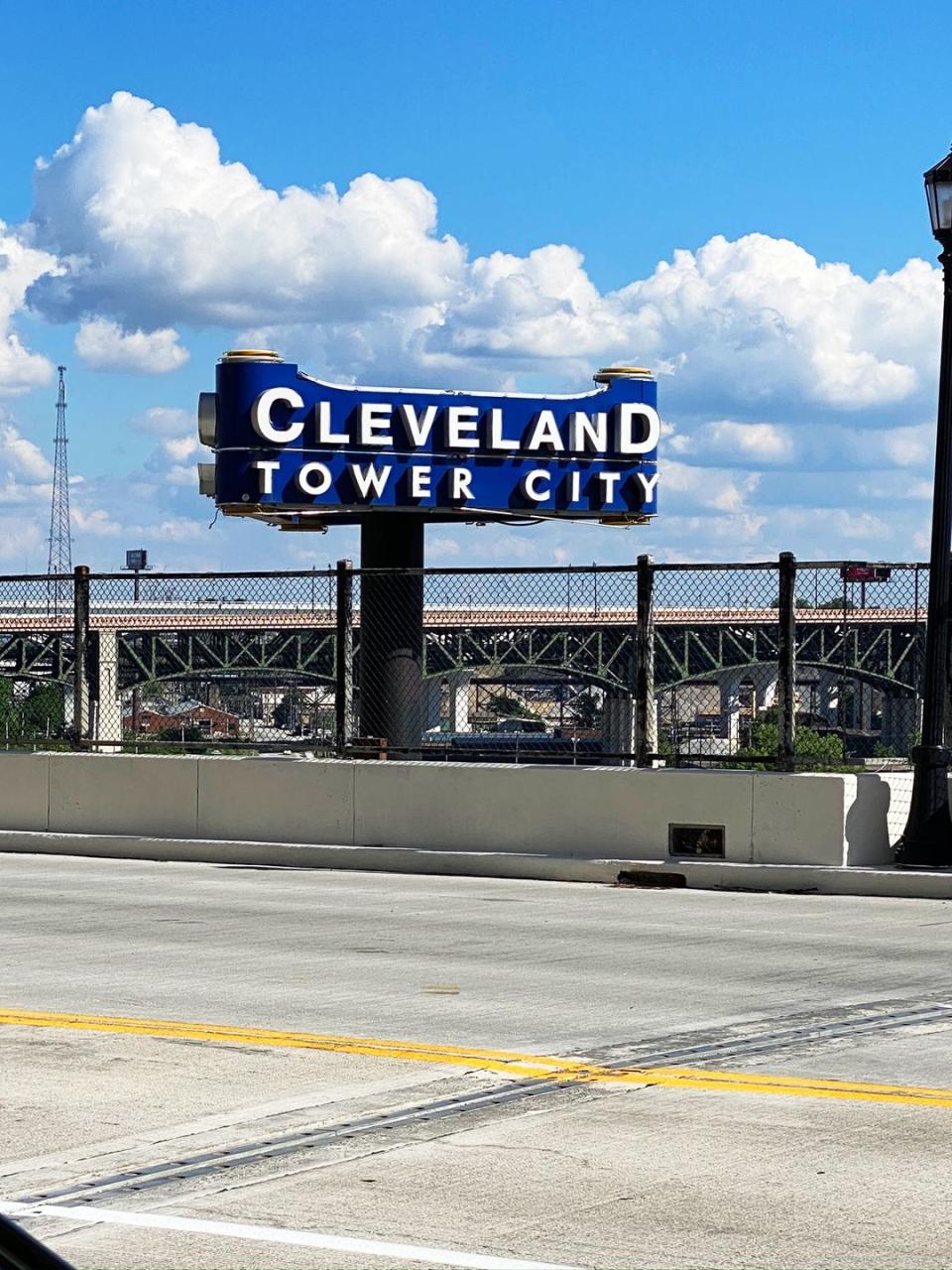
Spencer: I don’t know much about farming. I do know a lot about food, but somewhere along the supply line I become completely vexed. The farms of Ohio and Indiana could be growing just about anything. Mom asked as we whizzed by “what do you think they’re growing?” Firmly gripping the wheel, I replied, “it’s all corn to me.”
It’s quite beautiful scenery. Sprawling fields dotted with tufts of trees shading farmhouses and barns. Having grown up in New York, this lifestyle seems as alien as a foreign country. I couldn't help but be a little envious of the peace that this place radiates. Some six hours later: Chicago.
Chicago is a lot closer to home. The verticality I’m so accustomed to is back. People were actually walking on the sidewalk. Shafts of sunlight appeared between huge towers of metal and glass. Mom and I had a nice dinner on the outdoor terrace of our hotel. I could imagine living here someday. Then I remembered it was July.
Day Three
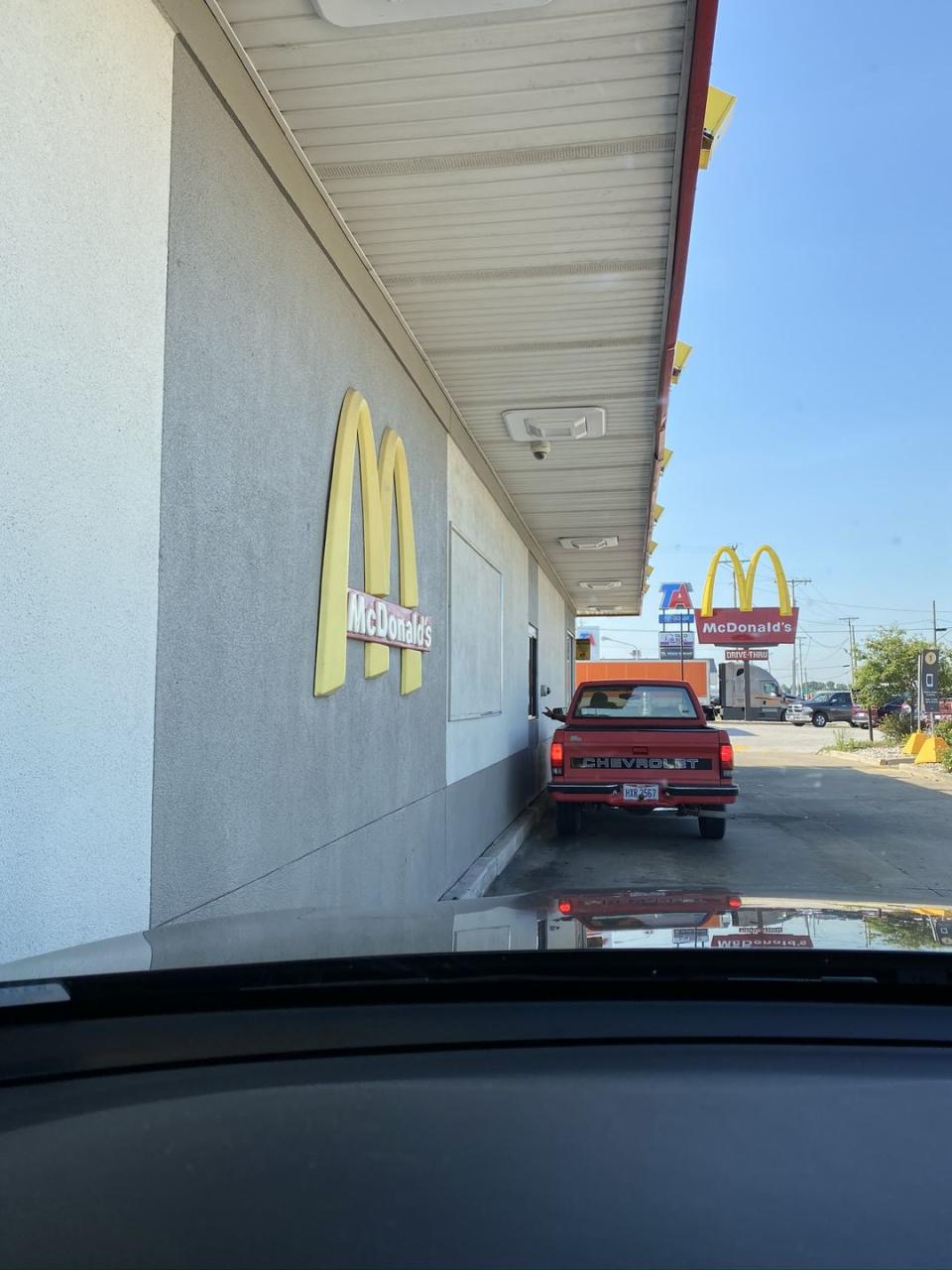
Cynthia: We woke up in Chicago. Raring to go. Spencer had studied the road atlas and now understood the way the national highway numbering system works. Maybe other people know this, but as a person who has spent most of her adult life running for planes, I can only tell you where the best airline clubs are located. And that was of little use.
We are very different people with very different strengths and weaknesses. (I am sorry to say, it took me way too long to learn this.) Spencer is calm, understated, and patient. I am none of those things. He knows Latin, has read Dante, can recite all the rules of grammar, and is quietly, deeply intellectual. Not me. I am practical and can make things happen. Like room service. Spencer speaks as little as possible, I talk to everyone.
So how were we getting along in this 24-hour lockdown? We were actually doing better than either of us expected. Forced cooperation was teaching us both patience. And respect. Chicago was at her finest: the day was warm, not hot, the sun was bright, not glaring. Everyone wore masks. We’d been upgraded at the Park Hyatt to a beautiful view of the lake having arrived the first day of their reopening. The staff seemed giddy with delight to see us. We were giddy with delight at a real roof-top restaurant.
Chicago is a great city, except when it isn’t. The day we were there, 15 people were shot; three killed. Allow that to sink in. Let me pause for a moment to mention the bathroom and dining challenges of crossing the country during a pandemic. By the time we got to Chicago we had already stopped at three Dunkin' Donuts and as many McDonalds. In our defense. almost nothing was open but a smattering of fast food restaurants and gas stations. Our favorite, the ubiquitous “Kum and Go” found throughout the Midwest: Cheap gas, clean rest rooms, and great, gooey snacks. And the name, I mean, who can resist the sense of humor the owners must have. I mean, what more can you ask for from a highway pit stop?
Permit me a word about “fly-over country,” a term I admit I’ve used more than once. But never again. Such a foolish and demeaning term for the fulcrum of this country. I kept imagining what early settlers must have thought when they realized there was no end to these horizons.
Spencer: Speaking of Kum and Go, when I was in middle school, I had a manny. His name was Ariel, and I thought he was just about the coolest guy I’d ever met. He left us after a few years to go to the London School of Economics, and it took me a while to forgive him for that. He worked helping make sure people had food in South Sudan. Then lived in Geneva. Now he lives in Des Moines with his wife and three-year-old daughter. Mom and I rarely find ourselves in the Midwest, so it seemed like a good opportunity to visit. I haven’t seen him since his wedding a few years ago. The fact that he has a child is still confounding, even after meeting his precocious daughter. I can’t help but feel like an awkward 11-year-old again during our visit. Ariel is now the head of communications for Kum and Go.

Cynthia: I thought it would be a good idea for my boy, who was being raised largely by a coven of women, to have a young male around. Enter Ariel. Tall, lanky, and so casually cool he quickly won an awkward adolescent and his trying-to-reform helicopter mother over.
I once asked Ariel about a young woman he brought over for dinner. “Is she the one?” I whispered. “She’s ‘a’ one.” he replied. He married someone else. One of my favorite memories from those days took place in the back of a taxi. Spencer with admiration in his eyes said, “Ariel, why do all the girls like you so much?” “Spencer, my man,” intoned Ariel, “I was raised by a woman on her own… I know how they think. And so will you.” Prophesy. Ariel now is father to a darling little Goldie who is full of mischief telling us quite a number of times to “slow down.” Words Ariel will be repeating a lot in the years to come, I predict.
Day Four

Spencer: On our way through Missouri, I had an experience that probably pegs me as an East Coast city slicker. We stopped at a gas station and I went inside to take a much needed bathroom break. As I approached the door, a group of people got out of a car parked right next to the entrance. The man in front of me had a handgun in the back of his waistband. I was completely paralyzed. First, the very sight of a firearm so casually stored was stunning. In addition, the waistband seemed a somewhat illicit place to hold a gun. I would’ve thought any proud gun owner would use a holster, especially considering Missouri’s exceptionally lax gun laws. I soon was able to relax, however. He was just there to use the bathroom, same as me, but I still got back to the car at a brisk pace.
It feels unoriginal to call Kansas flat and boring, and to be honest one of the more exciting episodes of my short driving career happened on Interstate 70 heading west through the heart of the Sunflower State. I was cruising along the very straight road at about 70 miles per hour when I saw a blue smudge in the road. I thought it was strange, I hadn’t seen any road markings like that before. It soon dawned on me that the blue smudge was not painted on. It was, in fact, a blue metal ladder sprawled across the left lane. Thankfully, the Interstate was less than jammed and avoiding it was just a fairly simple if urgent matter of changing lanes. The excitement was front loaded in Kansas. After that incident not much of note happened for a few hundred miles. As we entered Colorado things stayed flat but began sloping ever so slightly upward. The shadows of the Rockies slowly erupted from the horizon. We pulled into Denver and went to sleep early. We had a long day ahead.
Day Five

Cynthia: As an investigative reporter, I must confess to sometimes astounding myself by my naïveté. It never occurred to me that driving through the Rockies from Denver to Las Vegas might be a bit of a challenge. Not even a post from an Instagram follower, saying her husband insisted on taking a longer route to avoid the Rockies, tipped me off.
So, here we were, me at the wheel at 5:45 am headed out of Denver. A tender pink light shone. Within minutes the Mile High City became the terrifying Rockies. Hair-pin turns, 18-wheelers, and nowhere near enough coffee had me gripping the wheel this time and wondering if it was too late to hire a driver. Spencer saw I was in trouble. Kindly offering words of encouragement like, “you’re doing great,” “this should be over soon,” and “no way am I driving, did you see how close that truck came to us?”
I had skied in these mountains. I should have known. The posted grade went to 6% incline, which, trust me, feels like 90%. Truck “run offs” did nothing to calm my nerves instead fueling my now very active imagination. I am sure it was beautiful. Ask Spencer. I only had eyes for the road.
Spencer: The Rockies were, in fact, quite beautiful. As we descended into the desert of southern Utah, I took the wheel. About a quarter of a mile across the state line, I was greeted with a sign that would define my driving experience for the next 400 miles: “Speed Limit: 80 mph.” This, of course, meant that the slowest anyone was going on the highway was 80. Pickups, station wagons, semi-trucks, and SUVs all rocketed by me. Incredible rock formations sprouted from the desert on either side of the road. We stopped at many of the scenic view rest stops, both to admire the scenery and to allow me to take a break from the road.
Mom and I took turns screaming across the desert until all of a sudden, we were in Las Vegas. The transition from empty desert to bright lights and towering hotels seemed almost instantaneous. Las Vegas was the only place we stopped where, barring masks, there was practically no indication that a pandemic was currently underway. People still packed themselves into dim casinos and boisterous restaurants. People were still getting drunk and losing money like only sunburned tourists in Las Vegas can. I have to say, it was pretty entertaining, especially after driving from Denver’s sedate Four Seasons.
Mom and I stayed at the Bellagio, where we watched the fountains dance in time to a smorgasbord of music including Pavarotti, Frank Sinatra, and Lady Gaga. The spectacle of towers of water doing ballet is a monument to American ingenuity and excess. Nowhere in the country seems more poorly situated for a water-based tourist attraction than Las Vegas, and yet here it was.
Cynthia: In celebration of making it across the Rockies I ordered room service. It arrived in paper bags. Vodka and caviar. Yes, I did. Spencer strongly objected saying such excess at this moment in history was simply uncouth. He was probably right, but hey, it was Vegas, baby, and I had driven over the Rockies. I cranked up the music, threw open the blinds, and watched a very wet floor show.
Day Six
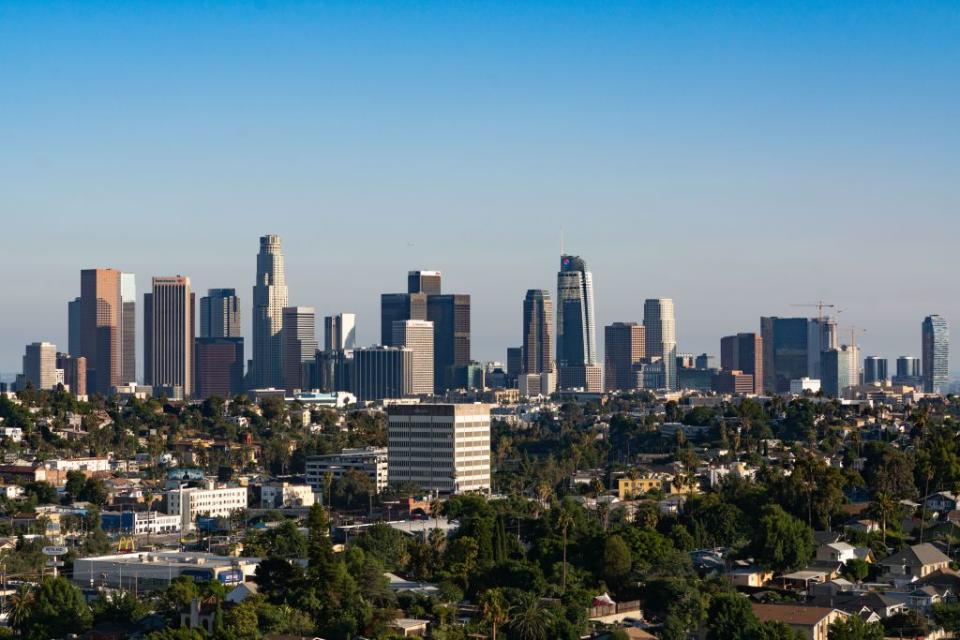
Cynthia: We agreed the drive the next morning from Vegas to LA would be a piece of cake. Except it wasn’t. The tyranny of the trucks. The heat. I worried the car might just explode from the desert heat. And there was traffic. Lots of traffic. Were all these people driving with their sons to load up college apartments? Who were they? Why were they traveling in a pandemic? Why were we?
At about 2 pm we decided to refuel the car and ourselves and had a moment of excitement when a series of enticing billboards lured up to a spot called “The Mad Greek.” We followed the signs only to discover it was closed for the pandemic. Next door was the “Alien Fresh Jerky” restaurant. Its parking lot was packed, but it seemed like too much work for the reward of jerky and a T-shirt. And anyway, McDonald’s beckoned. The highlight of that lunch was watching a crow bury a French fry in the sandy parking lot while we inched forward toward the drive-through window. This launched a conversation about the intelligence of crows that I felt was somewhat exaggerated. My son said they are as smart as dogs; that the crow would be back for that fry. I was less confident.
Spencer: I strongly encourage anyone to research corvid intelligence as they are surprisingly smart despite the lack of confidence demonstrated by my mother. Regardless, Las Vegas’s facade of luxurious comfort dissolved quickly into the vast expanse of desert. The car’s external thermometer read 109 degrees. “Dry heat” or not, even the quick scramble to the parking lot with our bags had left us dripping with sweat. The back of my shirt clung to the seat and despite the air conditioning, I still felt sticky under a patina of dried perspiration. I would not again feel at ease until we could see the Pacific.
For a highway in the middle of an inhospitable desert, the road was exceptionally busy. We saw helpless motorists on the side of the road, hands behind their heads or on their hips, as if the two-ton metal machine would feel bad enough to work again.
I have to admit that Mom did all the driving today, and it was a Herculean effort. Though not the longest of our days so far, it was a day of unrelenting stress. More windy mountainous roads, more trucks than ever, and at the very end, the chaos of Los Angeles traffic patterns. I’ve lived in LA for the past two years, but regrettably, I haven’t seen much of it besides the area around USC and parts of Venice and Santa Monica. A lot of this had to do with my inability to drive. As anyone who has spoken to a true Angeleno knows, you can’t get anywhere in LA without a car. The spider web of freeways that criss-cross LA County are wide and fast and filled to the brim with aggressive drivers who know what they’re doing. Trying to interpret the various signs and exit lanes and when to exit left or just bear left was maddening enough to me, a passenger, so I couldn’t fathom what Mom was going through.
Cynthia: Mom, couldn’t quite fathom it either. Entering the greater Los Angeles road space was one of the few times we turned off the music. I needed to suffer in silence. Every good road trip needs a soundtrack and Spencer was in charge of ours.
He created a fantastic playlist of my favorite music adding to it some of his. While I have made many mistakes as a mother, I take pride in having inculcated my son with a love of 1960s and ’70s music. In exchange he has taught me a thing or two about more contemporary fare. I will now admit to having a soft spot for J. Cole and Hozier mingled amid the Supremes and Stevie Wonder.
Spencer also curated a few podcasts. We developed a rhythm: In the car by 6 a.m. First, locating a Dunkin' Donuts for two large iced Americanos while listening to the New York Times podcast “The Daily.” One of Spencer’s jobs was to program the GPS to our destination by checking in the “Road Warrior” trip handbook, a pink plastic folder that I had filled with our hotel confirmations and a real day-by-day trip guide complete with the estimated driving time to the destination and hotel phone numbers. It helped. But best of all the stuff we brought along, better than even the Windex and paper towels, the toilet paper, and cold drinks was an old-fashioned road Atlas. Yes, GPS did most of the work, but having a detailed map to get an overview of our journey was both really fun and really helpful.
Next, we turned to a news podcast from London called “Monocle 24,” a very plummy and very British round-up of world events. I always felt a bit smug after listening, as in, “I bet we are the only car on this highway in which people are discussing the intricacies of the Hong Kong democratic movement.” Maybe not.
But it was a book on tape that really dazzled. Spencer had downloaded a few Audible books he thought we’d both like. We started a couple things but they didn’t click… by Indiana we had moved on to Erik Larsen’s masterpiece In the Garden of Beasts. The years leading up to the Nazi’s rise in Germany held us both spellbound for every minute of its 12 hours and 52 minutes. History, so finely told, it seems as if it must be fiction. I don’t want to spoil it for you. But let’s just say it begins in Chicago and moves to Berlin in the summer of 1927. It is a cautionary tale: the rise of the Third Reich, and their evil intent, so clear to those with the courage to see.
Day Eight
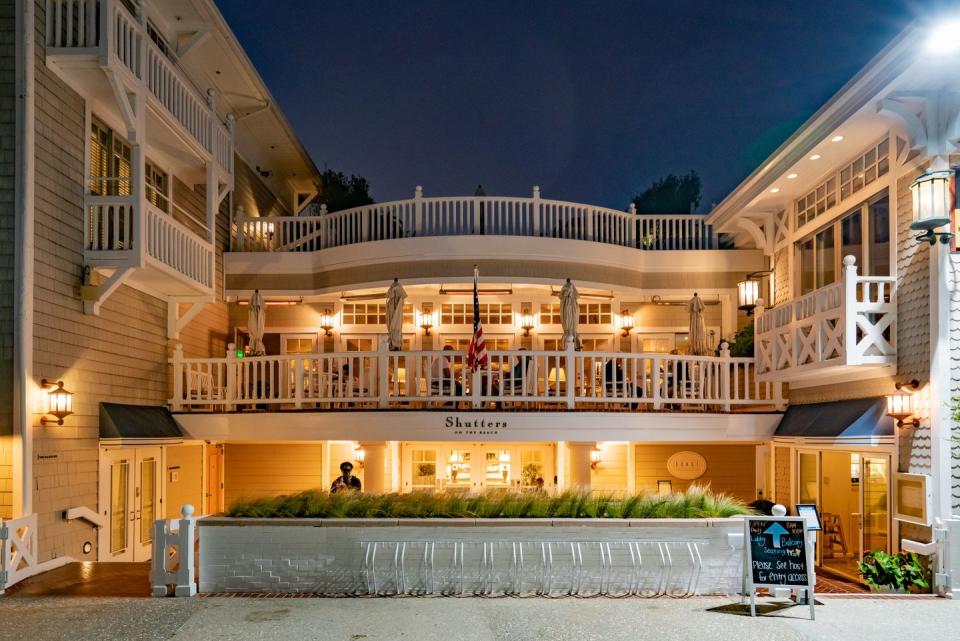
Cynthia: I needed a rest. I booked us at Shutters on the Beach, which is, as you might expect, on the beach. In Santa Monica. Lovely in that low-key, pastel, California way. Like just about every place we stayed, they’d just reopened after having been, well, shuttered. According to the American Hotel and Lodging Association, as of mid-May, 75% of hotel employees in the U.S. had been furloughed. Little wonder everybody was so happy to see us. There were more staff than guests but that suited us just fine. They took mask wearing and distancing seriously, and the valet put a little paper dress on the driver’s seat so as not to contaminate us or himself. We ate breakfast outdoors and dinner in our room We rode bikes on the beach and read books. We socially distanced with a couple of old friends. We sent the car for a check-up. She was ready to roll and so were we.
Day Nine
Spencer: The purpose of this trip was to move my belongings out of my apartment in Los Angeles, where I'm a student at the University of Southern California. I was dreading it. First of all, it was tedious work that I didn’t look forward to doing, and it would be another moment of realization that life was a long way from normal. This apartment, that for months was inhabited by me and my five roommates and constantly buzzing with energy, now felt like it had just been evacuated before some natural disaster. I suppose it had. It looked like life had been put on pause, expectantly waiting to resume. Skateboards still leaned up next to the door. There were books and shoes and plates everywhere just like usual. By the time we left, such signs of life were erased. It was deeply sad for me to say goodbye. I did anyway.
Day Eleven

Spencer: We woke up early to beat the traffic. Mom driving. By the time I had fully woken, we were almost to Barstow. There we would get on Interstate 40 and begin our return trip East in earnest. We careened toward Arizona to see the Grand Canyon. My late grandmother often complained to my mother that she was always taking me on trips to Europe but never to see the beauty of our own country, like the Grand Canyon or Niagara Falls. Well Grammy, I’ve seen it now, and you were right, I was really missing out. I hate to resort to cliche, but the beauty of the Grand Canyon is something that pictures (or words, for that matter) simply cannot capture. I won’t try to do so here. All I will say is that anyone who has the opportunity should see it in person. It is a natural wonder is the purest form of the word.
Day Thirteen
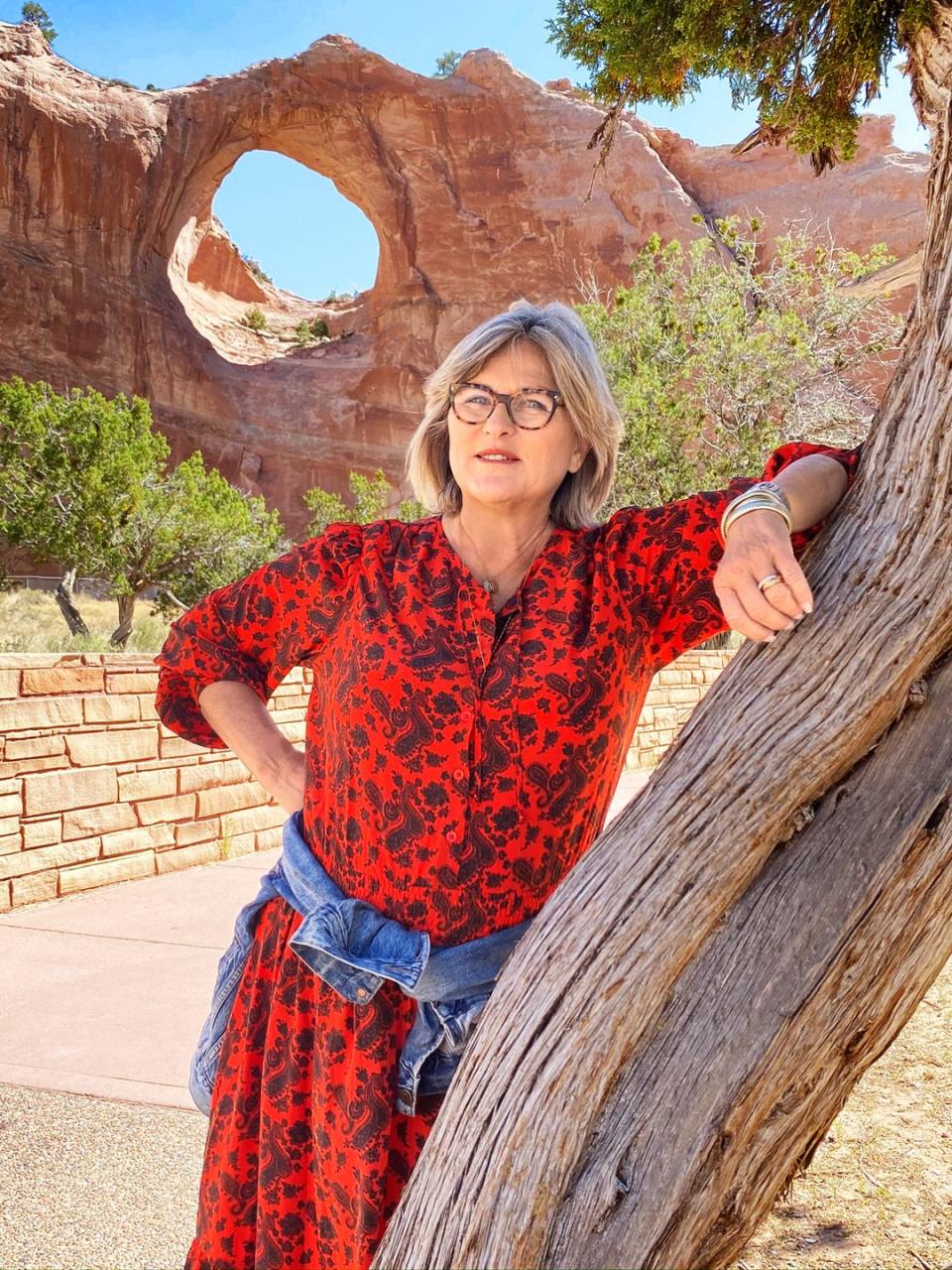
Cynthia: If Spencer’s motive for our cross-country road trip was to get his stuff, mine was to get to Navajo Nation, 27,000 square miles spread across Arizona, New Mexico and Utah. NBC said no to my flying and I was determined to get there. More than 30 percent of homes there have no running water, the same staggering number have no electricity. In America. In 2020. In a pandemic. The result of decades of broken promises by the Federal government. The death rate per capita there is greater than any U.S. state. Ditto the infection rate. This, not a question of race but of systemic racism. I had done a zoom story in April and hadn’t been able to get the people and the place out of my head. I needed to be there in person. I need to update the story. I needed to see for myself. For that, I needed Spencer.
Spencer: I’ve very often been adjacent to Mom while she works in places from Austin, Texas to Soweto, South Africa. I’ve traveled with her all over the world for work, but mostly I’m not involved in any way. This time was different. I became part of the production team because of a strange confluence of location, necessity, and nepotism. NBC News didn’t want any employees flying for obvious reasons, so the producer for the story was unable to get to Navajo Nation. That’s where I came in. While I am in no way qualified to replace an actual TV producer, I was able to carry equipment, take photos and short videos on Mom’s phone, and make sure the real producer was kept in the loop remotely. Most importantly, I could drive Mom to locations while she wrote questions and made calls.
One such drive that I’ll remember forever took us through Buffalo Pass, a steep winding road over a ridge. Remember the 6% incline going over the Rockies? Here the sign said to prepare for 40%. There is no such preparation. I did my best to keep up with our caravan of cameramen, sound engineers, and local guides who seemed to be having a lot less trouble than I was. But we made it.

The scenery of the Navajo Nation was absolutely beautiful, and I saw a lot of it driving 800 miles over those three days. Soaring mesas and rock formations of all kinds dotted the plains. Overall, it turned out to be an illuminating and inspiring experience. I now have an intimate knowledge of the incredible amount of work that goes into those three and a half or even five-minute pieces the public sees on TV.
More important, I also saw how the Navajo have been neglected and oppressed, just like so many indigenous people around the world. But here we were at home where we like to say we’re the greatest, wealthiest, and most powerful nation on Earth, how can it be that so many of the original citizens of this land go without electricity or running water? Beneath the natural beauty of the Navajo Nation, the US government has mined for uranium to be used for super weapons and that mining is still contaminating much of the groundwater with radioactive waste. Our nation's history with indigenous people is defined by atrocities and broken promises, and we have done little to make the future any different.
But I also saw resilience and reason for hope: despite it all, the people of Navajo Nation have done what many states in this country have found impossible: flatten their pandemic curve. They have followed protective measures like social distancing and wearing masks for the good of their community. I’m grateful to have had the opportunity to help document the stories of people who are too often ignored. But no, Mom, I still don’t want to be a journalist.
Day Fifteen
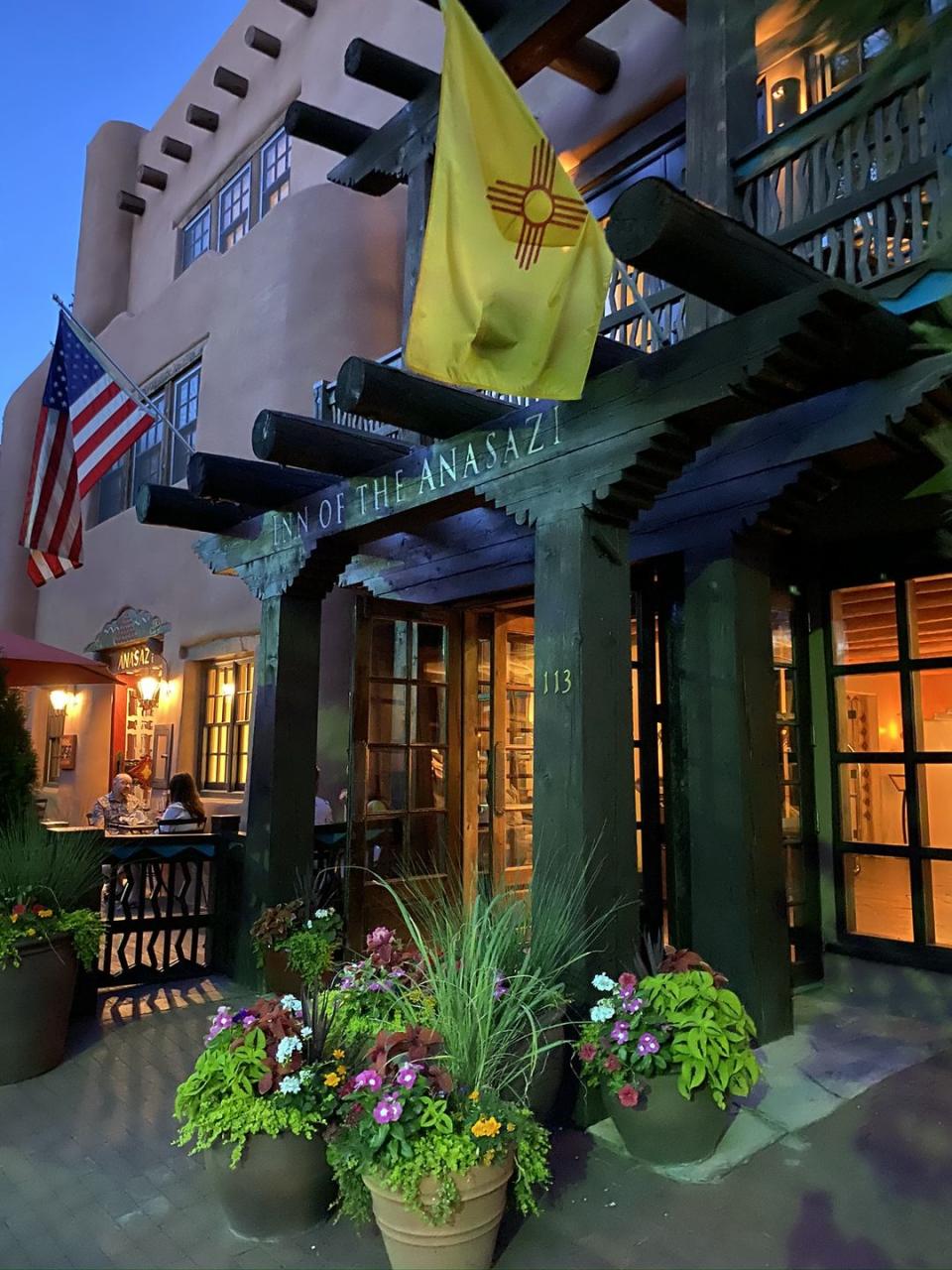
Cynthia: That, despite the fact Spencer gave me the penultimate question for the President of Navajo Nation, on day three as we drove to the interview. “Mom,” he said, maybe ask him this: “Do you believe the Federal government has the best interest of indigenous people at heart?” So I did. It was the only question and answer that aired on both Today and NBC Nightly News with Lester Holt.
Santa Fe is one of my favorite small cities. It is hard to beat the food, the architecture, and the art. We stayed at the divine Rosewood Inn of the Asasazi. Spencer was charmed by the place and we ate well and slept deeply until a malfunctioning something or other in the kitchen led to some kind of drilling at 7 am …. the hotel graciously took 50 % off the room rate. Good way to make friends. We’ll be back.
We took off later than usual for Oklahoma City, which meant that we were arriving after dark. I don’t like driving when it’s dark and as it was my job to get us into and out of the cities where we spent the night, I was holding my breath as we made a series of highway changes headed into downtown OKC. It was 10pm and we were surrounded by trucks and left-hand exits. On one stretch where concrete barriers lined each side of a single lane an 18-wheeler came so close we both gasped out loud. It may have saved our lives because I was shaken enough that I waited a beat when the light changed before pulling onto another roadway. In that split second—from out of nowhere—a car ran the red light at 80 mph. Had I pulled out with the light change we would have been T-boned. No doubt about it. It was a shattering moment where you realize what a role luck plays in our day to day lives.
Spencer and I looked at each other; we still had half the country to traverse. We silently crawled into the Colcord Hotel’s driveway. We survived our Waterloo but it dampened our high spirits. We now wanted to be home.
Day Seventeen
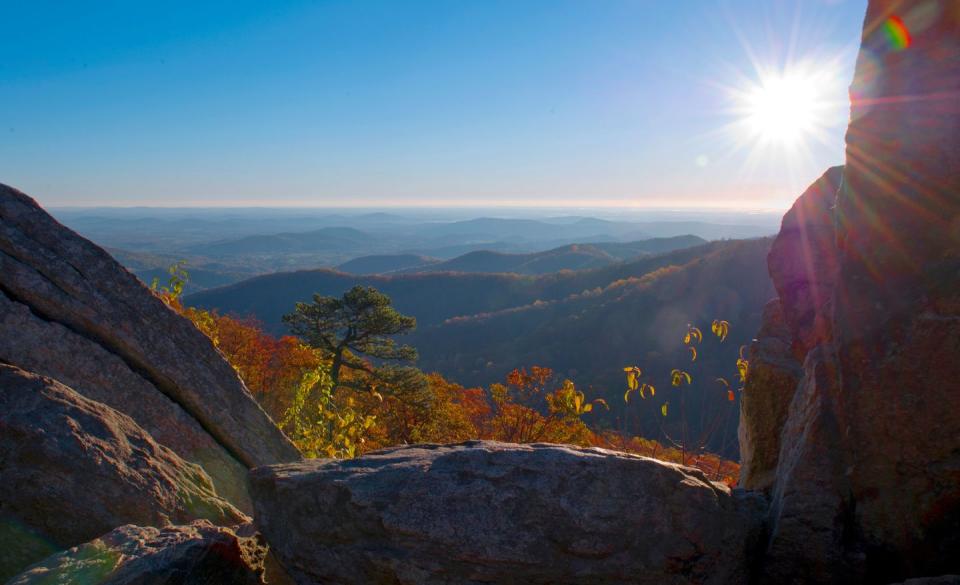
Spencer: The next day of driving was a long but overall uneventful one. Both Mom and I were exhausted and eager to get home. We were focused on the task of driving and little else. We arrived in Nashville and promptly collapsed in our hotel room. The thrill of adventure had faded.
When we woke up the next morning, Mom offered to drive around the city a little before heading out. I feel bad about blowing through such a historic place so quickly, but all I was interested in was getting back on the road. We climbed north through Tennessee and Virginia on our way to Washington, D.C. As we drove, I considered suggesting we follow the signs for the Blue Ridge Parkway. I felt that the last few days had been somewhat of a drag, and maybe doing something that was both fun and still moving us closer to home would do the trick.
We tried in Roanoke. We got off the Interstate and drove through the city of Roanoke only to find that this particular section of the Parkway was closed. Somewhat deflated, we got back on the highway and continued north, while I looked for another entrance.
We ended up taking the Skyline Drive through Shenandoah National Park. It was the perfect way to lift our spirits. The Park is gorgeous, and the experience of cruising beneath the canopy of trees, coming around a corner and seeing the vista of mountains stretch for miles was incredible. The road was practically empty, a far cry from the congested highways we’d been on. Eventually, however, we had to leave the Park. The speed limit was 25, and this diversion, while not stationary, had already cost us quite a bit of time. We descended from the ridge and cut through the back roads of rural Virginia and got back on the Interstate. We arrived in Washington later than anticipated, but more energized for the experience. We could see the finish line.
Cynthia: Spencer, I appreciate your discretion not mentioning that I bought the Senior-Lifetime-National-Park-Membership card when we entered the Skyline Drive—what a deal for $80! Spencer also failed to mention that he contacted his inner Le Mans driver on the empty Parkway, managing the turns like a champ at one point and proclaiming over the roar of the open windows, “I love driving.” Mission accomplished.
We hauled into DC at twilight. Spent a lovely evening in a large room at the Willard on Pennsylvania Avenue and Sunday morning headed north toward home through the empty streets of the Capital. Our hearts were light, though our luggage was heavy with dirty laundry.
Day Twenty
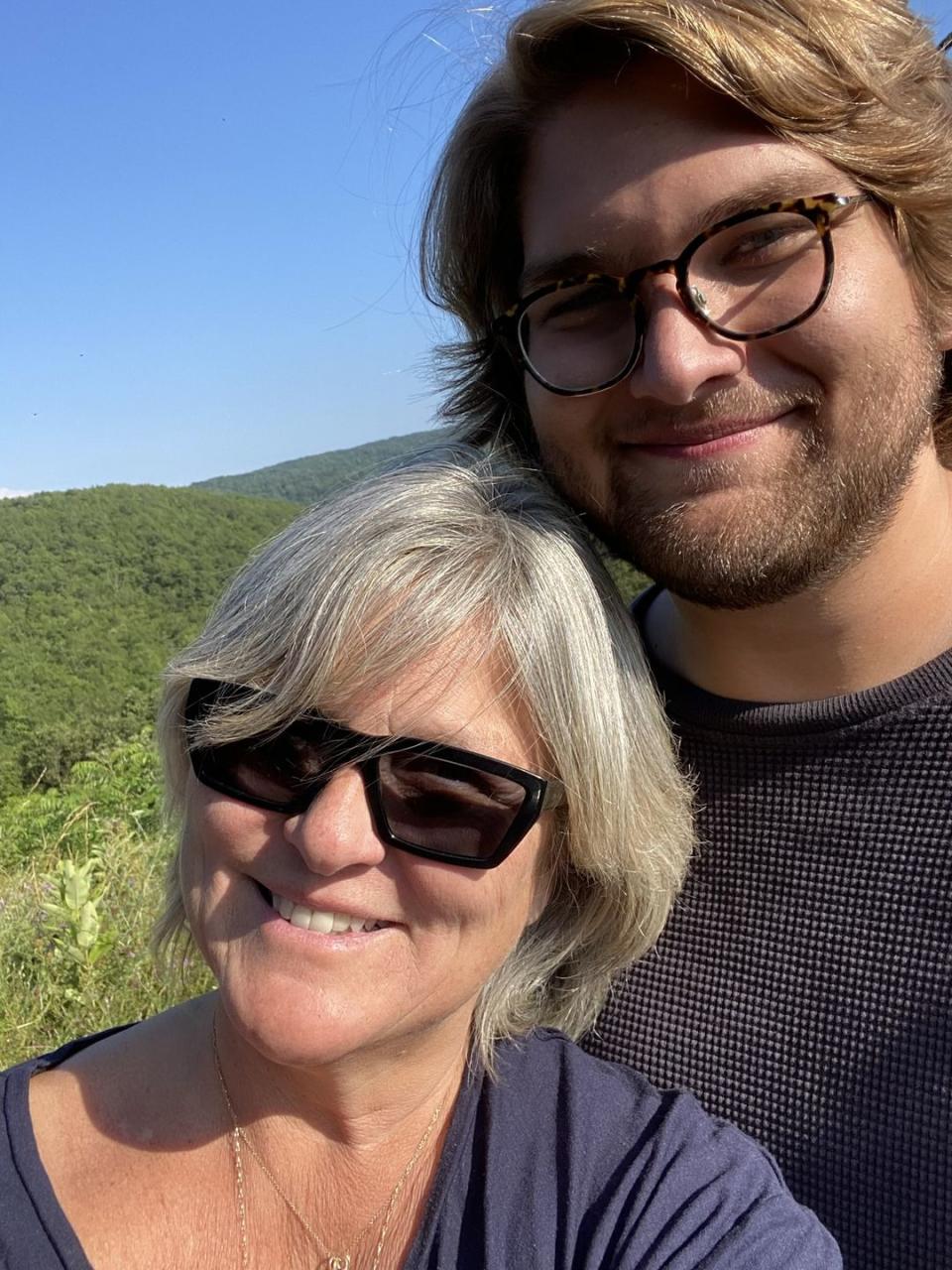
Cynthia: It was nice to get home. Nicer still to have gotten home with a barrel of memories. In the weeks since our return one picture recurs: the view from the passenger seat, watching Spencer gain confidence behind the wheel, laughing at some ridiculous song on the radio, explaining to me how wind turbines work. While time may erase the particulars, I won’t forget the feeling. We had made our way across the country in troubled times. I discovered my traveling companion was able to meet every challenge with good humor and kindness. We had shared something hard to put into words. We had discovered America together: her vastness, her diversity, we learned some things we did not like, and some that made us believe again in her promise. And like an old friend, together we had accepted she was ours. 7254 miles. Farther than driving the circumference of the moon. And Spencer learned to drive.
Spencer: The car didn’t break down. Neither of us got sick. We didn’t get in an accident. We didn’t have a catastrophic fight. I didn’t have a panic attack while I was driving. I didn’t get pulled over. I didn’t get arrested for driving without a license. I didn’t let Mom down. The possibility of failure has kept me from trying more times than I can count. This time it didn’t. I did something rather than nothing.
A version of this story appears in the November 2020 issue of Town & Country. SUBSCRIBE NOW
You Might Also Like

